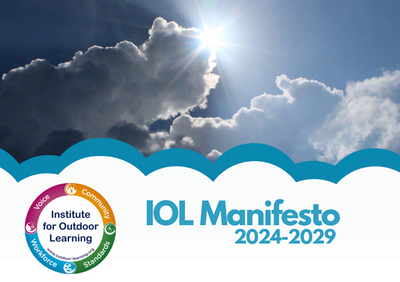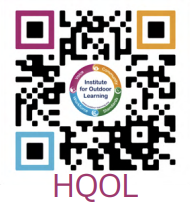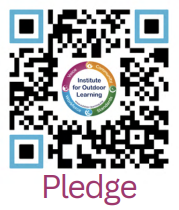About us and our work
Our Members have a shared vision of Outdoor Learning as a highly valued form of development, education and employment in UK society.
Outdoor learning is a term that covers ways of engaging with the outdoors for developmental purposes. It is about making the most of outdoor experiences so that children, young people and adults can become happier, healthier and more connected to others, their communities and the environment.
Central to outdoor learning is the role of the practitioner, whether regarded as a facilitator, instructor, teacher, coach, educator, tutor, therapist or guide. We support and develop the people and organisations that deliver outdoor learning.
The current challenges for children and young people in the UK today
Outdoor Learning practitioners are building on the distinguished heritage of outdoor learning in the UK and are ready to respond to the challenges facing young people today.
Mental wellbeing
Since the pandemic children’s mental health, communication skills and independence abilities have been widely reported as negatively affected. In a Children in Need survey, 44% of young people surveyed compared the weight of the worries they carry to books. There is a need for positive relationships which are trusting and safe connections between children and the important people in their lives. Such relationships are key in helping to prevent the development of mental health challenges.

Childhood obesity
We now have nearly a quarter of children in England obese or overweight by the time they start primary school aged five, and this rises to one third by the time they leave aged eleven. Our childhood obesity rates mean that the UK is now ranked among the worst in Western Europe. The burden of childhood obesity is being felt the hardest in low income and ethnic households and amongst ethnic minorities. We must equip children with the knowledge they need to lead healthy lifestyles and creating environments which encourage children and young people to eat healthily and be physically active.

School Attendance and Attainment
The average Attainment 8 score for key stage 4 pupils decreased between 2018/19 and 2022/23 academic years. [6] The pupils with the highest attainment at the end of key stage 2 and key stage 4 have higher rates of attendance over the key stage compared to those with the lowest attainment. For the most vulnerable pupils, regular attendance is also an important protective factor. This is essential for pupils to get the most out of their school experience, including their attainment, wellbeing, and wider life chances.
Youth Crime
Research has shown associations between regular absence from school and a number of extra-familial harms. This includes crime with 90% of young offenders had been persistently absent, and 83% of knife possession offenders had been persistently absent in at least 1 of the 5 years of study. In 2024, arrests of children increased for the second consecutive year and first time entrants to the youth justice system increased for the first time in the last ten years.
Youth unemployment
Young people have consistently the highest rates of unemployment in the UK. In May 2024 approximately 28.3 percent of people aged 16 to 17 were unemployed, with the 18-24 years the next highest rate at 12%. This is linked to a lack of work experience desired by employers.
Sustainability and Climate Change
Children and young people are worried about climate change and the future of our planet. They want to care for the natural world, protect it and influence others to do the same. To do this they need to learn about, and through, the outdoors and to act for the environment. There are 16 million children, young people and adults in education in the UK and by guaranteeing these learners regular time in nature, we are making their connection with a greener future.
With you, we can help
1. We ask every political party to commit to the inclusion of outdoor learning as a core part of the national curriculums of all home nations.
Outdoor learning is a method of teaching and learning practice with an emphasis on experiential learning. The outdoor activity specific technical skills and environmental knowledge can also be delivered as a curriculum subject.
Outdoor learning is fundamental to teaching life-long behaviours, character and power skills. With the rapid increase in our technological ability to access knowledge (e.g. artificial intelligence), employers are increasingly prioritising these life-long behaviours, character, and intra and inter-personal skills.
The DEFRA funded Natural Connections Demonstration Project (2016), together with numerous other pieces of research evidence, show that when outdoor learning is a core part of an educational curriculum then academic attainment is raised. Evidence shows that academic attainment is raised across all subjects, including and in many cases especially the core of science, English and mathematics. [12] [10]
Additionally, supporting the inclusion of outdoor learning as a core part of the curriculum, is its ability to enhance the health and well-being of pupils and teaching staff and the associated short and long-term public health benefits.
Scotland already explicitly includes the use of the outdoor environment as a necessary approach and context for delivering its education curriculum. The Curriculum for Wales has ‘Being Outdoors’ as a key feature of a successful teaching method. This is the time to bring outdoor learning into consistent mainstream practice across the UK.
2. We ask every political party recognises that outdoor learning is integral to youth work practice of all home nations.
Of the 14 million young people in the UK, only 4 million have access to youth work provision. With an Outdoor Learning and Youth Work approach, play access can be extended, and the vital role of supporting the holistic development of young people will incrementally increase. Young people’s life skills and opportunities will improve. This does require equitable access to outdoor learning experiences that support young people with their personal, social and educational development, and helps their well being.
Youth workers and outdoor learning practitioners with shared skills are now collectively working towards an environment where 'outdoor learning youth work practice' becomes fully recognised and is utilised as a valuable part of the ecosystem that develops young people.
We can deliver
3. We ask every political party to recognise and value the outdoor learning workforce as a national asset.
Outdoor learning practitioners provide safe activities and effective learning in the outdoors for the benefit of individuals, communities, society and the economy.
They are trained, experienced and uphold the values and behaviours that help others learn in their environment, gain skills and make a positive difference for our world.
Practitioners in outdoor learning may volunteer, work full-time or part-role to positively impact areas such as sports participation, outdoor education, youth development, wellbeing, workforce training or adventure tourism.
The Institute for Outdoor Learning has over 20 years, established a progressive professional development scheme that supports continuing professional development.

Registered Practitioners plan, prepare and lead safe and engaging outdoor learning sessions to achieve intended outcomes. Accredited Practitioners have a passion for outdoor learning and have experience planning, leading and evaluating programmes for individuals and groups. Leading Practitioners are champions of outdoor learning and have a depth of experience and evidence of influencing the wider sector beyond their workplace or specialist interest area.
The Institute for Outdoor Learning together with many other Governing Bodies, Quality Assurance and Best Practice organisations have rigorous procedures, policies and accreditations that can ensure a professional, quality and developmental outdoor learning provision. These qualifications include, Level 3 and Level 5 apprenticeship standards, professional accreditation, and the National Outdoor Learning Award.
This means that Government, Ofsted, Headteachers, Decision Makers and other stakeholders will have confidence that it is possible to deliver an enhancing, personalised, quality curriculum using competent and qualified outdoor teaching and youth work staff, in the here and now.

Positive Impact on Society from Life Long Outdoor Learning
Through outdoor learning we support the development of sustainable behaviours in young people and adults which lead to Personal happiness, health and self-fulfilment Preparedness for work and economic independence Readiness for active stewardship and citizenship Outdoor Learning is Life Long Learning.
The Institute for Outdoor Learning supports people developing new skills and gaining new qualifications and professional accreditations at times in their lives, which is right for them.
The Evidence in One Place
High Quality Outdoor Learning 2024
High Quality Outdoor Learning 2024 draws on teaching and youth work standards and frameworks, academic research, industry standards and practice-based experience. This document sets out the latest evidence based common good practice.
Pledge your support
We’re asking MPs to show their commitment to using outdoor learning in formal education and youth work by engaging with the MP Support Group for Outdoor Learning and its important role in progressing the IOLManifesto 2024-2029.
Connecting MPs with Outdoor Learning Providers
Outdoor Learning Providers by Parliamentary Constituency To open the map use the QR Code reader or the link (MP Support Group for Outdoor Learning). There are map legends of MP Constituencies, Providers and IOL Leading Practitioners. Click on any of the markers and it will take you to their contact details.



